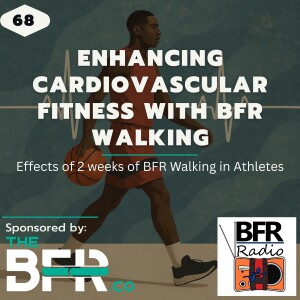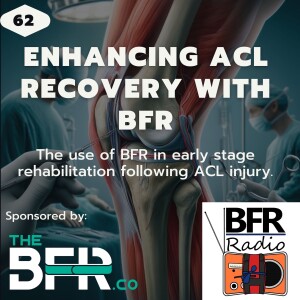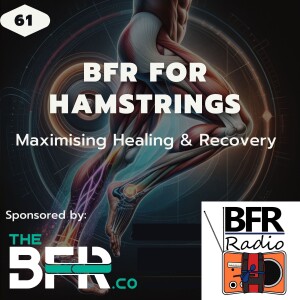Episodes

Thursday Jul 03, 2025
Thursday Jul 03, 2025
In this episode of BFR Radio, we explores a novel and practical approach to blood flow restriction (BFR) training—applying BFR after sprint intervals, during the recovery period.
Drawing on recent research in trained cyclists, we examine how this method can significantly increase VO₂max (by 4.5%) without compromising sprint performance or technique.
This episode goes beyond the data—highlighting why improving aerobic capacity matters, particularly for athletes in sprint-based or high-intensity intermittent sports. Enhancing oxygen delivery and mitochondrial density not only supports aerobic efficiency but also plays a key role in buffering capacity, lactate clearance, and recovery between high-output efforts.
Key Points Discussed:
- Study overview: Sprint interval training with post-exercise BFR
- Increases in VO₂max without detriment to sprint performance
- Muscle biopsy findings: HIF-1α and its role in angiogenesis
- Why aerobic development is critical—even for sprinters
- Potential applications in track and field (200–400m), rugby sevens, and other high-intensity running sports
- Practical programming: Suggested BFR recovery protocol after sprint efforts
- Short- vs long-term adaptation: What to monitor beyond VO₂max
This approach is particularly valuable when BFR during the work phase is not feasible or tolerable. By applying BFR during passive recovery, coaches and athletes may unlock meaningful adaptations without interfering with intensity or movement quality.
Thanks for listening, and remember to keep the pump!
Chris
📍Learn more or purchase cuffs: www.thebfr.co📩 Connect or share your experience using this method: @thebfr.co
🎧 Subscribe and rate BFR Radio wherever you listen
🔁 Found this valuable? Please share with a colleague, athlete, or coach

Wednesday Jun 11, 2025
Unlocking Aerobic and Strength Gains with BFR Cycling
Wednesday Jun 11, 2025
Wednesday Jun 11, 2025
In the latest episode of BFR Radio, I continue the journey of BFR aerobic exercise and look into the benefits of BFR cycling combined with high-intensity interval training for cyclists.
In episode 3, I covered a BFR cycling training study that compared low-intensity BFR cycling with more traditional high-intensity interval training. The results for including low-intensity BFR cycling were surprising in producing both aerobic and strength gains.
In this episode, I am reviewing a comprehensive 2022 study, examining how BFR cycling not only improves VO2 max and endurance but also significantly enhances muscle size and strength.
Article: Tangchaisuriya, P., Chuensiri, N., Tanaka, H., & Suksom, D. (2021). Physiological Adaptations to High-Intensity Interval Training Combined with Blood Flow Restriction in Masters Road Cyclists. Medicine and science in sports and exercise, 54(5), 830-840.
I’ll go into the specific training protocols used, the physiological responses measured, and the remarkable performance outcomes observed. I also share practical tips for integrating BFR sessions into your training regimen to maximise both strength and aerobic capacity. This episode highlights the value of BFR cycling as a powerful tool for enhancing athletic performance, particularly for aging athletes, and also athletes who want to maximise their training.
Enjoy
Chris
00:00 Introduction to BFR Radio
00:31 Recap of Previous Episode
00:51 Study Overview: Low Intensity Cycling with BFR
02:57 Study Results: Aerobic and Strength Gains
03:39 New Study on Masters Road Cyclists
04:45 Training Protocols and Methods
08:11 Detailed Results and Findings
14:18 Practical Applications and Recommendations
16:40 Conclusion and Contact Information

Monday May 12, 2025
Enhancing Cardiovascular Fitness with 2 Weeks of BFR Walking in Athletes
Monday May 12, 2025
Monday May 12, 2025
In this episode of BFR Radio, we explore a fascinating training study that challenges conventional thinking around aerobic development. Can low-speed walking combined with blood flow restriction (BFR) significantly improve endurance capacity — even in already trained athletes?
We dive into the research by Park et al., where trained male basketball players performed just two weeks of low-intensity BFR walking. The results? Remarkable improvements in VO₂max, cardiovascular efficiency, and ventilatory capacity — all without high training loads.
Whether you're a coach, rehab specialist, or athlete, this episode offers a compelling case for using BFR walking as a low-impact, time-efficient, and performance-enhancing conditioning tool.
🔍 In This Episode, You’ll Learn:
-
📚 Background and context from early BFR-walking studies (Abe et al., 2006)
-
🏋️♂️ Full breakdown of the Park et al. protocol, including pressures, session structure, and frequency
-
📈 The surprising physiological adaptations observed in just 14 days
-
💡 Practical applications: from rehab to in-season support and off-season recovery
-
🧠 How to integrate BFR walking into a real-world weekly training program
💡 Key Takeaways:
-
VO₂max increased by 11.6% in just two weeks
-
Stroke volume ↑ 21.4%, heart rate ↓ ~13%
-
Excellent option for injured, in-season, or travelling athletes
-
Can be programmed in short, low-stress sessions (e.g., 15–20 mins)
🧰 Resources & Links:
-
Visit: www.thebfr.co to learn more or purchase your own BFR cuffs
-
Follow us on Instagram: @thebfr.co
-
Contact Chris via the website or DM for programming support
-
Listen to our previous BFR + aerobic training episodes in the podcast archive

Monday Mar 10, 2025
Managing Achilles Tendinopathy and Toe Arthritis - Questions in Cars
Monday Mar 10, 2025
Monday Mar 10, 2025
In this Questions in Cars episode of BFR Radio, I answer a rugby player’s question about using Blood Flow Restriction (BFR) training to manage Achilles tendinopathy and arthritis in the big toe.
With pre-season in full swing, high running loads are a challenge for tendon health, making rehab strategies crucial. We break down how BFR can be used as both a pain management and strength tool, how it compares to traditional high-load isometric and eccentric training, and how to incorporate morning activation sessions for optimal recovery.
Tune in to learn how to integrate BFR into your routine for long-term tendon resilience.
Timestamps:
00:36 Listener's Question: Rugby Player's Tendinopathy
01:35 Traditional Methods for Tendinopathy
02:53 Benefits of BFR for Tendinopathy and Arthritis
03:45 Morning Activation Routine with BFR
05:54 Daily BFR Protocols for Pain Management
07:14 Strength Training with BFR
11:14 Pre-Running BFR Routine
12:37 Hormonal and Recovery Benefits of BFR
15:25 Long-Term BFR Strategies
Links & Resources:
- BFR cuffs & online training programs: www.thebfr.co
- Instagram: @thebfr.co
- Twitter: @thebfr_co

Sunday Feb 02, 2025
Sunday Feb 02, 2025
Welcome to BFR Radio, and Happy New Year! 🎉 This episode marks our first episode of 2025, and we’re diving into a fascinating and underexplored topic—Blood Flow Restriction (BFR) training and its potential role in supporting bone health.
One of our listeners recently reached out about a 15-year-old client with Osteogenesis Imperfecta (OI)—a rare genetic condition that leads to brittle bones. Given the limitations of traditional strength training for individuals with OI, the question was:
💡 Can BFR provide a safe and effective alternative to stimulate bone adaptation without excessive mechanical load?
While no direct research exists on BFR and OI, we explore scientific insights from BFR studies on osteoporosis, bone formation markers, and vascular function—all of which may provide clues to its potential benefits for fragile bones.
What You’ll Learn in This Episode:
🔬 Understanding Osteogenesis Imperfecta (OI)
✔️ What is OI? Causes, types, and symptoms
✔️ Why traditional strength training poses risks for individuals with OI
💡 How Bone Adapts to Stress & the Role of BFR
✔️ Mechanical loading & bone remodeling
✔️ The role of collagen production, IGF-1, and VEGF in bone health
✔️ The importance of bone resorption and formation markers
🔥 BFR & Bone Health: What the Science Says
✔️ Research on BFR & bone mineral density (BMD)
✔️ How BFR impacts bone remodeling markers like BALP, P1NP, and CTX
✔️ Evidence from osteoporosis research and its possible relevance for OI
📌 Practical Applications for Using BFR with Fragile Bones
✔️ Key safety considerations for using BFR in clinical populations
✔️ Starting guidelines for BFR training with fragile bones
✔️ Monitoring progress & adjusting training variables
Key Takeaways:
✅ BFR does not directly replace mechanical loading, but research suggests it can increase bone formation markers and collagen production—which may benefit those with fragile bones.
✅ While no direct studies exist on BFR & OI, findings from osteoporosis and low bone mass studies suggest potential bone-strengthening benefits of BFR.
✅ Starting BFR conservatively—with low pressures, progressive exposure, and careful monitoring—may be key to safely integrating BFR into a bone health program.
Resources & Links:
📌 Learn More About BFR & Get Your Own Cuffs: www.thebfr.co
📌 Follow Us on Socials for More BFR Insights: @thebfr.co
💬 Got Questions or a Topic You Want Covered?
Reach out via our website or DM us on Instagram!
🎧 Enjoyed This Episode?
If you found this episode valuable, please share it with someone who might benefit and leave a 5-star review on iTunes to help others discover BFR Radio!
🚀 Until next time, keep the pump! 💪

Monday Nov 18, 2024
Kelly Penfold - S&C Coach: Unlocking the Power of BFR
Monday Nov 18, 2024
Monday Nov 18, 2024
In this episode of BFR Radio, Kelly Penfold, an experienced ACA Elite Strength and Conditioning Coach, discusses her journey and application of blood flow restriction (BFR) training.
Kelly shares her extensive background, working with the Queensland Firebirds netball team and individual elite sport athletes among others.

Wednesday Sep 25, 2024
Wednesday Sep 25, 2024
In this episode of BFR Radio, we dive into the challenges of managing tendon pain, focusing on Osgood-Schlatter disease and patellar tendonitis.
Inspired by a recent conversation with a parent whose child faces knee issues in volleyball, Chris explores evidence-based treatments that go beyond traditional approaches. Whether you're dealing with adolescent athletes or adults with tendon pain, learn how to incorporate isometric exercises, red light therapy, patella tendon straps, and blood flow restriction (BFR) training into recovery.
From progressive strengthening to nutritional supplements and BFR's low-load benefits, this episode offers valuable insights into promoting long-term tendon health. This is a practical, "how-to" episode with lots of great takeaways.
Tune in to discover ways to help athletes return to sport pain-free and stronger than ever.
If you're enjoying the podcast, please give it a rating on iTunes.
Thanks for listening and remember to keep the pump.
Chris

Wednesday Jul 03, 2024
The Impact of BFR in Biceps Tendon Rehabilitation
Wednesday Jul 03, 2024
Wednesday Jul 03, 2024
In this episode of BFR Radio, it is a solid discussion on the use of BFR for tendon injuries.
After the previous episode reviewing an excellent article on the many ways to incorporate BFR into an ACL post-surgery rehab program, this episode’s topic centres around the use of BFR in the rehabilitation of a distal biceps brachii tendon rupture, showcasing a weightlifter's case study.
Before we get into the podcast, I’ll also give you an update with an athlete that I coach on a recent hamstring (tendon) injury that he unfortunately sustained. Although this injury hasn’t been great, the rehab process has been fascinating and I give an update of some of the progress we’ve made in a quick time period.
Back to the main focus of the podcast, this episode is a case study of a weightlifter who used BFR to assist in an accelerated rehab program post-surgery. The discussion on the use of BFR for Key topics include the anatomy of the bicep, the typical causes and an overview of the 15-week accelerated BFR rehab program. As always, I try to provide addition insight and offer a few additional ways to incorporate BFR to enhance this rehab process.
If you’re interested in me putting together an episode around Cedric’s hamstring rehab or even a live Q&A let me know.
00:00 Introduction and Previous Episode Recap
00:57 Cedric Dubler's Olympic Journey and Hamstring Injury
03:44 Today's Topic: BFR and Bicep Ruptures
04:36 Understanding Distal Biceps Brachii Tendon Ruptures
07:03 Post-Surgery Rehabilitation and BFR Training
07:35 Case Study: Rehabilitation Program
15:05 Mechanisms and Benefits of BFR Training
17:44 Additional Rehabilitation Strategies
If you're looking at purchasing your own set of BFR cuffs visit www.thebfr.co

Thursday Apr 11, 2024
Enhancing ACL Recovery with Blood Flow Restriction Training
Thursday Apr 11, 2024
Thursday Apr 11, 2024
Enhancing ACL Rehab with BFR Training: Insights and Applications
In this episode of BFR Radio, the focus is on utilising Blood Flow Restriction (BFR) training in the early stage of ACL rehabilitation. Dr. Gaviglio reviews a recent article from the ASPETAR Sports Medicine Journal,
THE USE OF BLOOD FLOW RESTRICTION IN EARLY STAGE REHABILITATION FOLLOWING ACL INJURY
This article highlights the multitude of ways that you can incorporate BFR for rehabilitation strategies post-surgery, and discusses how BFR training can mitigate muscle atrophy, aid in muscle hypertrophy, and improve recovery due to its low-load nature and ability to selectively activate muscle fibers.
The episode also discusses the safety and effectiveness of BFR in clinical settings, its potential in preserving bone mass, reducing pain, and improving function post ACL reconstruction. We also outline practical guidelines for implementing BFR in the rehabilitation process and highlights the potential of BFR as a performance enhancement tool beyond ACL rehab.
00:00 Welcome to BFR Radio: Unveiling the Power of Blood Flow Restriction Training
01:09 Diving Deep into BFR's Role in ACL Rehabilitation
02:21 Understanding ACL Injuries and the Shift in Rehabilitation Approaches
06:07 The Science Behind BFR: Enhancing Muscle Recovery and Strength
11:34 Practical Application of BFR in ACL Rehab: From Theory to Practice
24:32 The Future of BFR in Sports Rehabilitation and Beyond
27:16 Closing Thoughts and How to Get Started with BFR

Wednesday Feb 07, 2024
BFR for Hamstrings - Maximising Healing & Recovery
Wednesday Feb 07, 2024
Wednesday Feb 07, 2024
In this episode of BFR Radio, we delve into the use of Blood Flow Restriction (BFR) training as an effective method for accelerating hamstring recovery in athletes. Chris details a real-world case where BFR training helped a decathlete recover from a grade-two hamstring tear in time to compete in the Tokyo Olympics. He explains the science behind BFR, highlighting the role of immune cells, cytokines, especially interleukin 6, and myoblast cells in muscle repair. He also shares a practical guide on using BFR cuffs to increase stress on the body and stimulate these molecules and signaling pathways. In addition, he provides actionable advice on maintaining fitness levels and targeting specific strength areas at different stages of recovery.
00:00 Introduction to BFR Radio and the Host
00:35 Introduction to the 'Questions in Cars' Segment
00:54 Case Study: Incorporating BFR in Hamstring Injury Rehabilitation
02:44 Understanding the Mechanisms of BFR
06:06 Practical Application of BFR in Injury Rehabilitation
06:51 Specific BFR Exercises for Hamstring Injury
09:28 Advanced BFR Techniques for Hamstring Rehabilitation
12:51 Maintaining Fitness and Strength During Rehabilitation
15:13 End Stage Rehabilitation and Preventing Future Injuries

